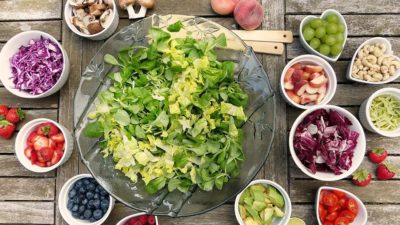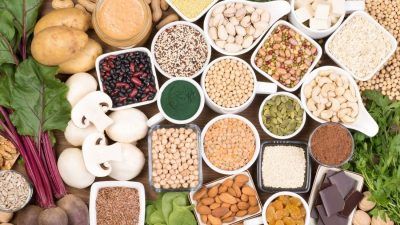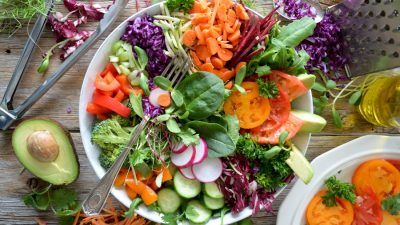12 things you need to know about B12

Most major health organisations agree – a well-planned vegan diet is healthy and suitable for all stages of life. Part of that planning involves making sure we are getting all the vitamins and minerals we need. Thankfully, most can be obtained by eating a wide variety of fruits and vegetables, pulses, wholegrains, nuts and seeds, but one or two need to be supplemented. If you’re living in the northern hemisphere, a vitamin D supplement is advised during winter. But regardless of where you are in the world, a supplement everyone following a plant-based diet needs to take is vitamin B12. Here’s why.
1. Everyone needs a regular source of vitamin B12 and for vegans this means a supplement
Make no mistake, vitamin B12 is an important nutrient as it helps make our red blood cells and DNA and keeps our nervous system healthy. It’s an essential nutrient as our body cannot make it itself so we need to obtain it from external sources. Whereas once we’d get it from unwashed plant foods, nowadays we need to take a supplement. This is not a weakness of a vegan diet, but a reflection of the times in which we live.
2. B12 is not ‘naturally’ present in meat and dairy
B12 is often cited as a vitamin found ‘naturally’ only in meat, dairy and other animal foods. The argument that ‘vegans have to take pills’ is used to claim that veganism is unnatural but, of course, it’s a bit more complicated than that. B12 is naturally made by bacteria in soil and water but can be grown in industrial-sized vats for supplements. Traditionally, farmed animals would have got their B12 from water and eating food from the ground but with so many now confined in factory farms, farmed animals themselves are given B12 supplements. So, whatever you eat, B12 comes from a supplement – but you can get it without the cruelty to animals.
3. B12 is important for DNA synthesis
Vitamin B12 plays an important role in the production of our DNA, which is the genetic material in all our cells, so it is safe to say that we wouldn’t be who we are without B12. If we don’t have enough B12, our cells are not able to function properly, leading to very serious health problems.
4. If you lack vitamin B12 you could suffer from vitamin B12 anaemia
Vitamin B12 plays a crucial part in the function of red blood cells. Without B12, your red blood cells aren’t able to carry oxygen around your body properly. Symptoms of B12 anaemia include fatigue, lethargy, breathlessness, dizziness and headaches.
5. B12 deficiency can lead to irreversible neurological damage
A lack of B12 can lead to damage of the myelin sheath which wraps around our nerves so deficiency is frequently associated with neurological problems. These can include loss of sensation and muscle weakness.
6. The brain needs B12
Other serious neurological problems associated with B12 deficiency affect the brain. It may play a causal role in depression, anxiety, psychosis, dementia and delirium. Maintaining healthy levels of B12 may protect against Alzheimer’s disease whereas an inadequate intake has been linked to cognitive decline. A 2022 article stated that “The other mental changes associated with B12 deficiency include apathy, agitation, impaired concentration, insomnia, persecutory delusions, auditory and visual hallucinations and disorganized [sic] thought-process.”
7. Inadequate B12 may affect bone health
A 2009 study found that vegetarians with a lower level of B12 in their blood had a higher rate of bone turnover, which could have adverse effects on bone health. We therefore need to make sure we’re getting enough B12, as well as calcium and vitamin D, for optimal bone health.
8. There are two main forms of B12:
Two main forms of B12 supplements are available. Cyanocobalamin is a cheap and stable form of B12 used in most fortified foods and supplements – suitable for most people.
Methylcobalamin is an ‘active’ form of vitamin B12, that costs more but is not as stable – recommended for smokers and people with kidney problems. Either will work just fine but cyanocobalamin may be preferred as it is easier to find, cheaper and is also what is used in most B12 research studies.
9. B12 is crucial for pregnant women and the health of their baby
Several studies have found that women who are of child-bearing age, pregnant or lactating are at a much higher risk of B12 deficiency. As well as being bad for the mother-to-be, for all the reasons stated above, it is also dangerous for the unborn child as inadequate B12 levels are associated with premature births and low birth weights.
10. Everyone over the age of 50 should consider taking a B12 supplement
B12 absorption is a complicated process that declines with age and B12 in meat and dairy is bound to animal protein, making it even harder to absorb. Up to 40 percent of older people (regardless of diet) in the UK suffer from low B12 and in the US, everyone over 50 is advised to take a supplement.
11. Overdosing on B12 is very unlikely
Vitamin B12 is water-soluble so if you take too much, it simply comes out in your urine. Guidelines say that up to 2,000 micrograms a day is unlikely to cause problems, but you shouldn’t (and don’t need to) take more than that. In fact, 2,000 micrograms a week (or 50 micrograms a day) will keep your B12 stores in good stock.
12. B12 can be hard to absorb
At the best of times, vitamin B12 is hard for our body to absorb but can also be inhibited by poorly functioning kidneys, cigarette smoke, nitrous oxide used for anaesthesia, heating food in a microwave or cooker and some medications, including Metformin (for diabetes), anticonvulsants and proton pump inhibitors (PPI’s). This is why, even though we only need around six micrograms a day, Viva! recommends taking 50 micrograms a day or 2000 micrograms a week to ensure we’re getting enough.
The bottom line is that vitamin B12 is a vitally important nutrient we cannot afford to neglect. All vegans, and everyone over 50, should take a supplement – and there’s no reason not to. They’re cheap, easy to find, come in many forms including tiny tablets and sprays, and have no negative side effects. If your body doesn’t need all the B12 in the supplement, you will simply pee it out!
Viva! recommends you cut out the middleman and take your own B12 and think it is so important we’ve slashed the price of our Better You Boost B12 Oral Spray 25ml.







